Tom's Hardware Verdict
The HP FX700 is the perfect secondary gaming SSD when you want to add some extra capacity. It’s efficient and cool-running, but sustained performance is weak and pricing is currently unknown.
Pros
- +
Adequate all-around performance for QLC
- +
Very power-efficient
- +
Runs cool with its included graphene pad
Cons
- -
Pricing and availability remain question marks
- -
Poor sustained performance
Why you can trust Tom's Hardware
We haven’t heard from HP in a while, but it recently served up an interesting SSD in the FX700. This is the first drive we’ve tested with YMTC’s newest QLC, built around a Maxio controller that’s been disruptive in the SSD space and powers some of the best SSDs and best PS5 SSDs.
The dream of inexpensive, capacious SSDs has been realized as of 2023, and with the FX700 this dream is taken a step further. The use of QLC rather than TLC NAND should reduce the price even more, but what about the performance? Historically this platform has been power-efficient, great for laptop and PS5 users who especially like single-sided drives. Can QLC possibly improve things there as well?
We’re happy to say that this QLC is very efficient and, with HP’s graphene thermal pad, the drive runs pretty cool as well. We haven’t nailed down pricing just yet, but it should undercut the TLC alternatives — like the Lexar NM790 and Addlink A93 — and the FX700 is just the beginning. We’ll be seeing this hardware from other manufacturers in due time. Performance for a drive of this nature is good enough where it matters and it should find a happy home as secondary storage in any system. Sustained performance, as always an issue with QLC, remains more problematic.
That is to say that this QLC is not otherworldly and miracles should not be expected. If you’re looking for an alternative to the Crucial P3 Plus or Corsair MP600 Core XT, though, this can get you a bit more speed without any further drawbacks. It’s probably even a good alternative to the PCIe 3.0 Crucial P3 and the popular, TLC-clad Teamgroup MP34, too. Hopefully you can save a bit of money over the NM790 or A93, and for basic secondary storage it can be a good pick over older mainstays like the Silicon Power XS70. Read on to see if the FX700 hits the right notes for you as we dig into deeper details on this new hardware.
HP FX700 Specifications
| Product | 512GB | 1TB | 2TB | 4TB |
|---|---|---|---|---|
| Pricing | N/A | N/A | N/A | N/A |
| Form Factor | M.2 2280 | M.2 2280 | M.2 2280 | M.2 2280 |
| Interface / Protocol | x4 PCIe 4.0 | NVMe 2.0 | x4 PCIe 4.0 | NVMe 2.0 | x4 PCIe 4.0 | NVMe 2.0 | x4 PCIe 4.0 | NVMe 2.0 |
| Controller | Maxio MAP1602 | Maxio MAP1602 | Maxio MAP1602 | Maxio MAP1602 |
| DRAM | No (HMB) | No (HMB) | No (HMB) | No (HMB) |
| Flash Memory | 232-Layer YMTC QLC | 232-Layer YMTC QLC | 232-Layer YMTC QLC | 232-Layer YMTC QLC |
| Sequential Read | 6,300 MB/s | 7,200 MB/s | 7,200 MB/s | 7,200 MB/s |
| Sequential Write | 3,100 MB/s | 6,200 MB/s | 6,200 MB/s | 6,200 MB/s |
| Random Read | 567K IOPS | 1040K IOPS | 1050K IOPS | 1000K IOPS |
| Random Write | 586K IOPS | 809K IOPS | 721K IOPS | 920K IOPS |
| Security | N/A | N/A | N/A | N/A |
| Endurance (TBW) | 200TB | 400TB | 800TB | 1600TB |
| Part Number | 8U2N1AA | 8U2N3AA | 8U2N5AA | 8U2N7AA |
| Warranty | 5-Year | 5-Year | 5-Year | 5-Year |
The HP FX700 is available in 512GB, 1TB, 2TB, and 4TB capacities. The 4TB SKU is missing in action so far, but we know this drive’s controller can handle that much flash just fine. Currently, the drive cannot be found in the U.S., but it and many drives like it are destined to make their way here. The product numbers are not explicitly listed, but we can guess what they are from product listings.
Rough comparison pricing from other regions suggests that the 2TB, as reviewed here, should come in at $89.99 or less with the 1TB being at $50 or less. This puts it below sale price of drives like the Crucial T500, which makes sense as we’re dealing with QLC. Put another way, pricing will make or break the viability of the HP FX700. The T500 is a great all-around SSD, and we've seen it on sale for around $107 for the 2TB model. It's a bit weak on sustained write performance, but still well ahead of what you can expect from QLC-based drives.
The FX700 can reach up to 7,200 / 6,200 MB/s for sequential reads and writes and up to 1050K / 920K random read and write IOPS, depending on the capacity. The 512GB SKU is woefully short on dies and should probably be ignored. The drive is backed by a 5-year, 400TB of writes per TB warranty. This delivers 0.22 drive writes per day (DWPD) which is about 33% less than standard TLC but up to double what QLC used to provide. Biwin’s site erroneously lists 800TBW for the 4TB SKU, but a look at the datasheet shows the expected 1600TBW. In any case, this is sufficient write endurance.
HP FX700 2TB: Software and accessories
HP’s SSDs are supported by an OEM version of Acronis True Image, which is useful for backups, cloning, and imaging. Health data should be monitored with CrystalDiskInfo. Biwin has historically released firmware updates when absolutely necessary, but the level of support here is less than you will find with vendors like Samsung, WD, or Crucial. The FX700 is a budget drive, so take that into consideration.
HP FX700 2TB: A closer look
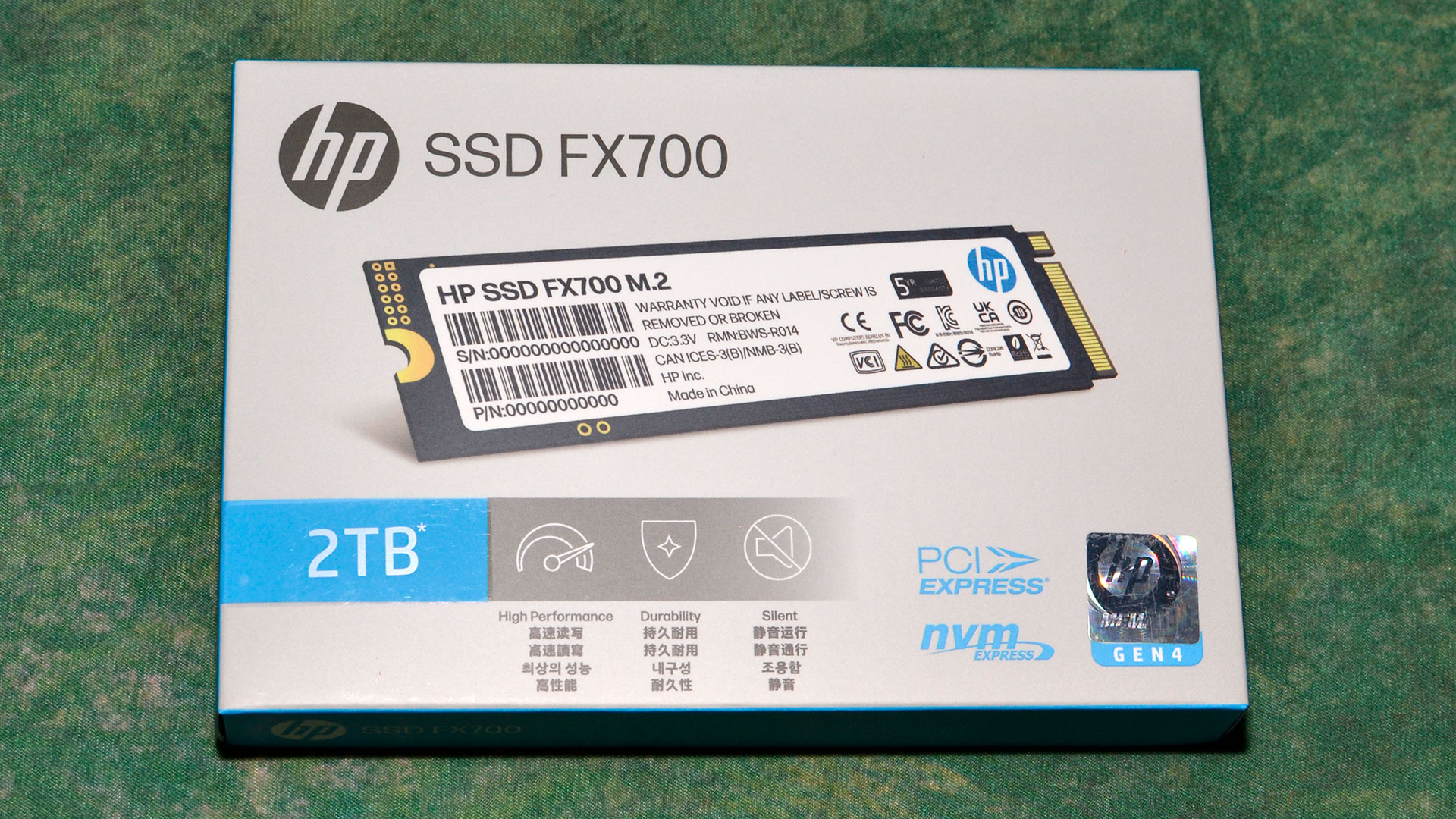
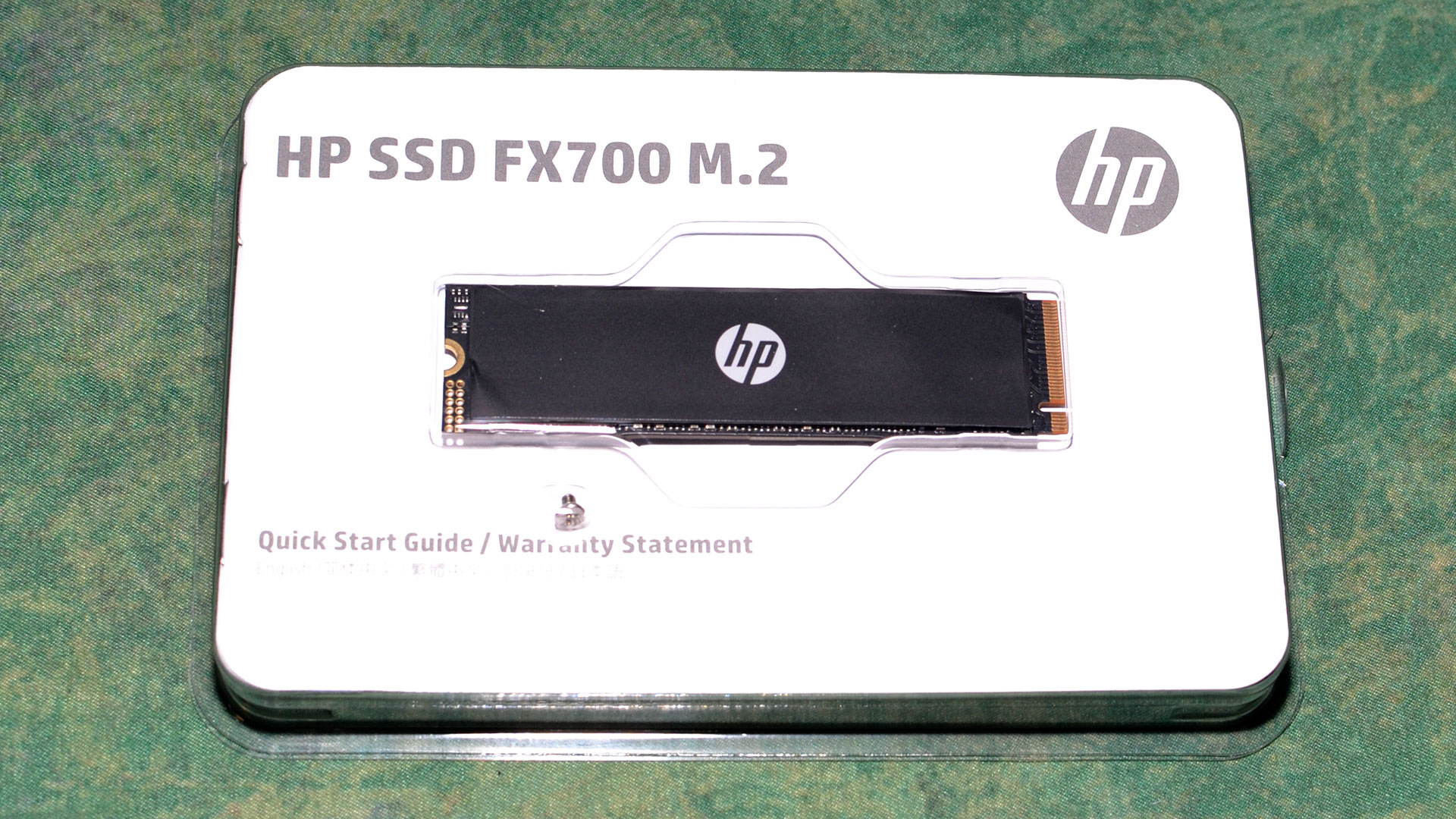
The HP FX700 looks unexceptional, except that it comes with its own M.2 screw. HP has done this with its drives since at least the EX920. Your motherboard should provide the necessary hardware for installing an M.2 SSD, but things happen and sometimes the screw gets lost — not a problem here. It’s also worth mentioning that the FX700 is single-sided, which makes it usable in more systems and laptops, and HP markets the drive specifically for the PlayStation 5.
HP’s datasheet for the drive emphasizes the power efficiency of the drive for use in laptops. There's a built-in power management unit (PMU) for the host controller with a power management IC (PMIC). This is an interesting note as SMI recently detailed its PCIe 5.0 SM2508 SSD controller as having an intelligent PMIC for better power management without placing a burden on the main ARM processor. Designing for better power efficiency is a good thing, given the heavy results we’ve seen with Phison’s PCIe 5.0 E26 controller so far.
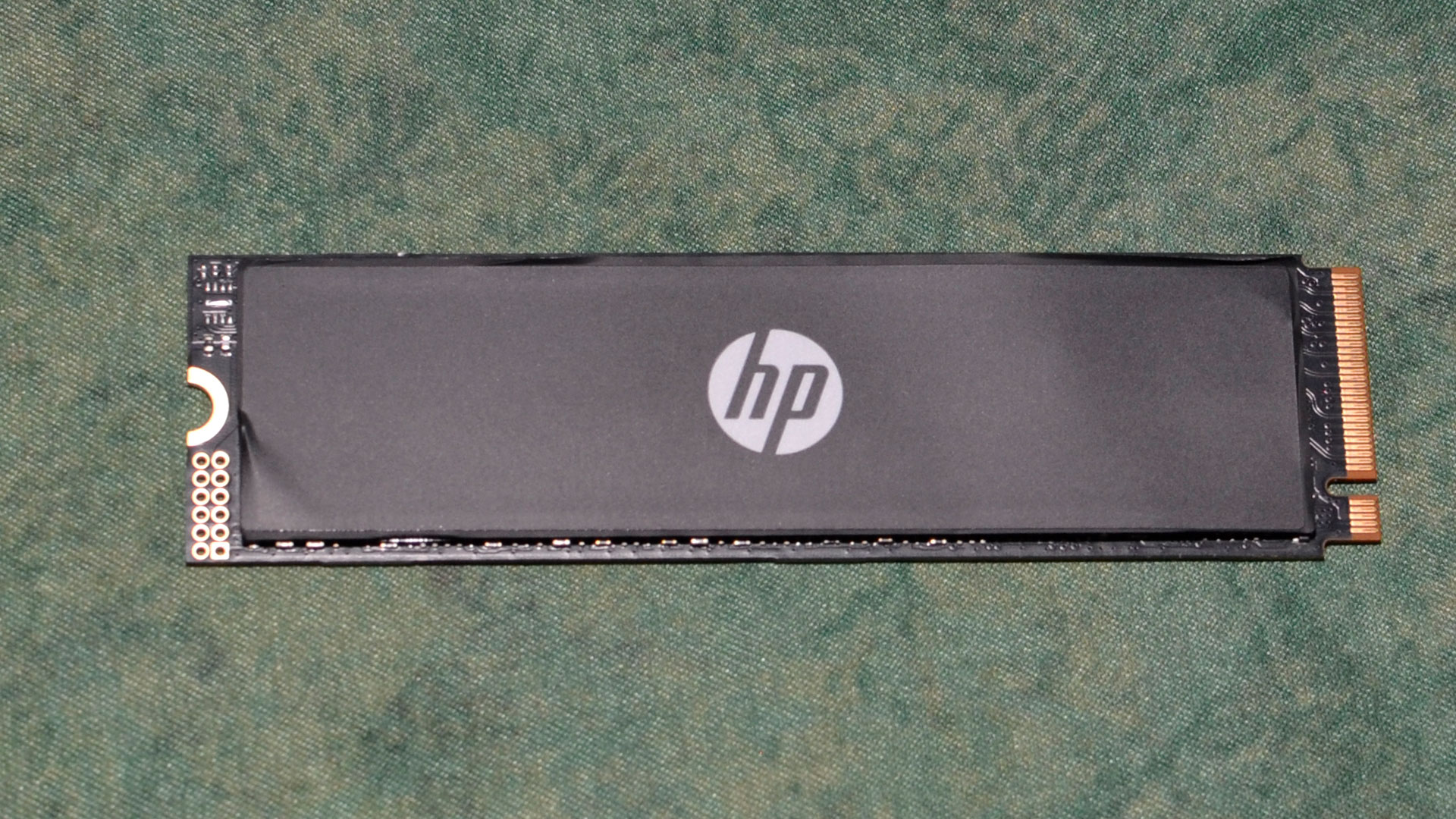
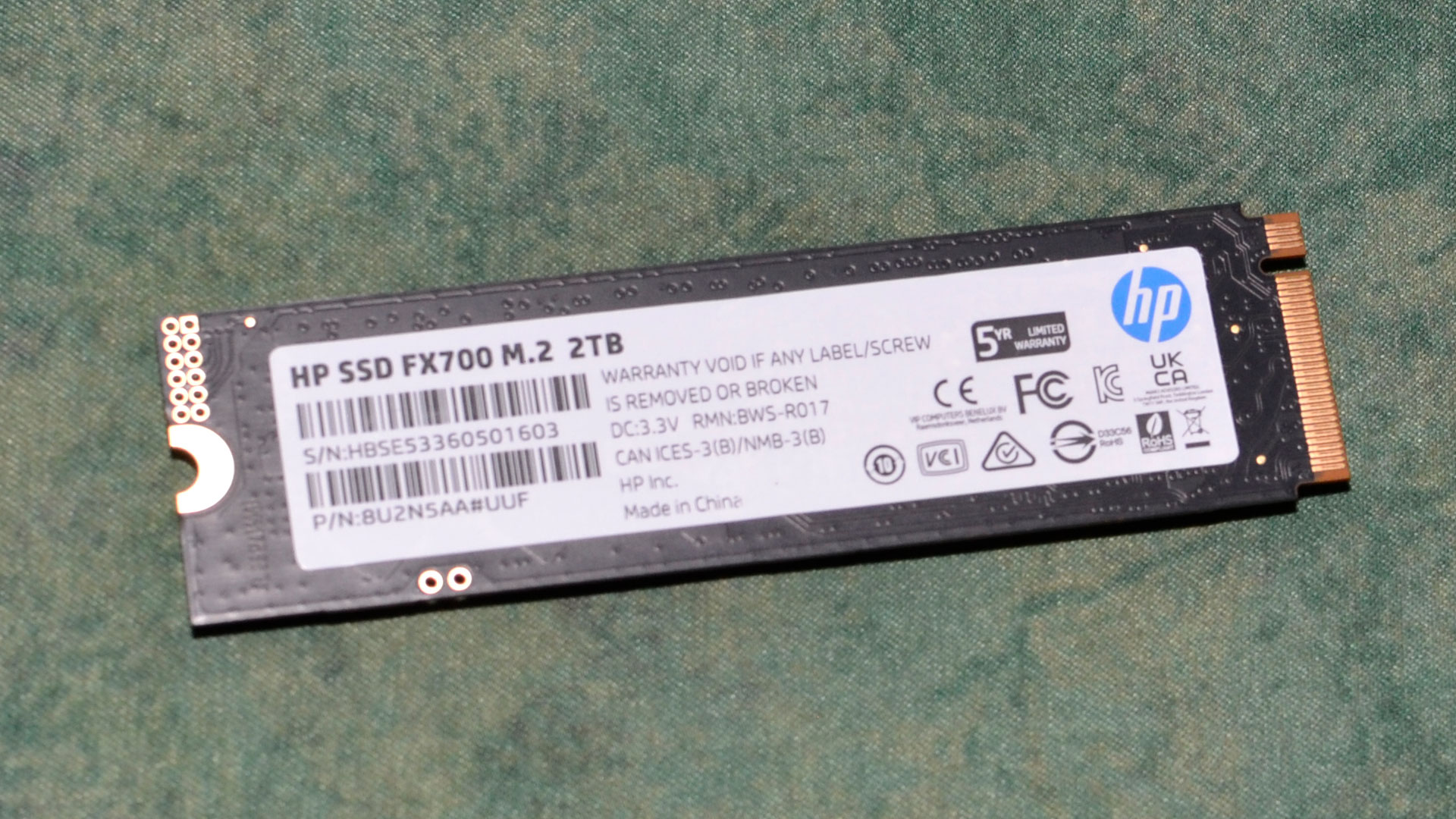
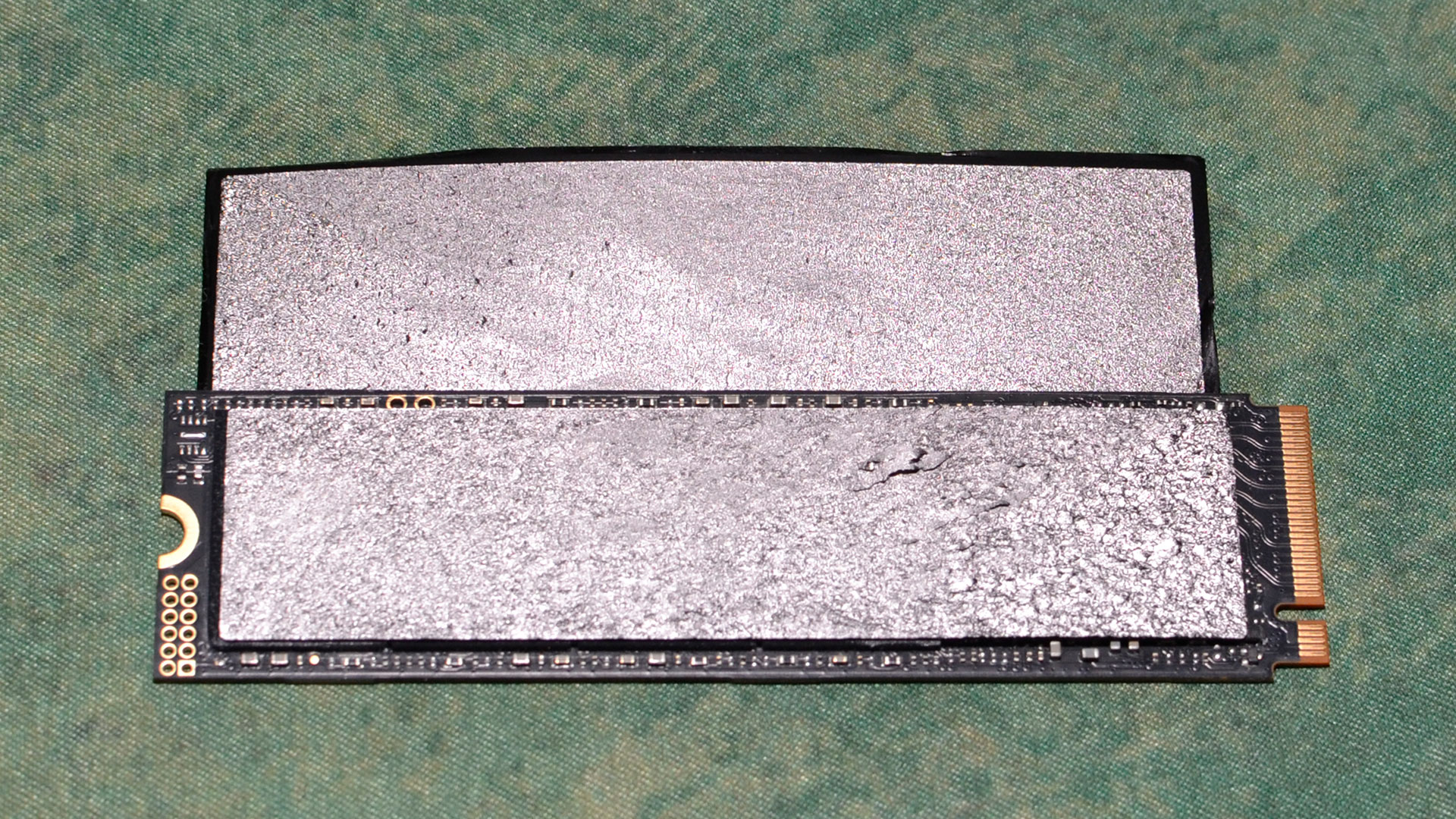
HP uses a graphene heatspreader to help cool the FX700. We discussed graphene and nanocarbon cooling technologies in our Gigabyte Aorus Gen5 12000 review. Gigabyte’s heatsink is considerably more involved than this heatspreader, but HP’s solution is better than nothing. Pulling off the sticker is likely to rip it apart, which we've done in our teardown.
The drive uses the Maxio MAP1602A, which generally runs quite efficiently. However, the controller package itself is known to get quite hot, as it uses a material that is less conductive with a smaller surface area than the T500’s Phison E25. This presents a scenario where a heatspreader makes sense, and the use of graphene in a thicker pad will significantly mitigate the issue. Extra heat on the NAND flash is not worthy of concern.
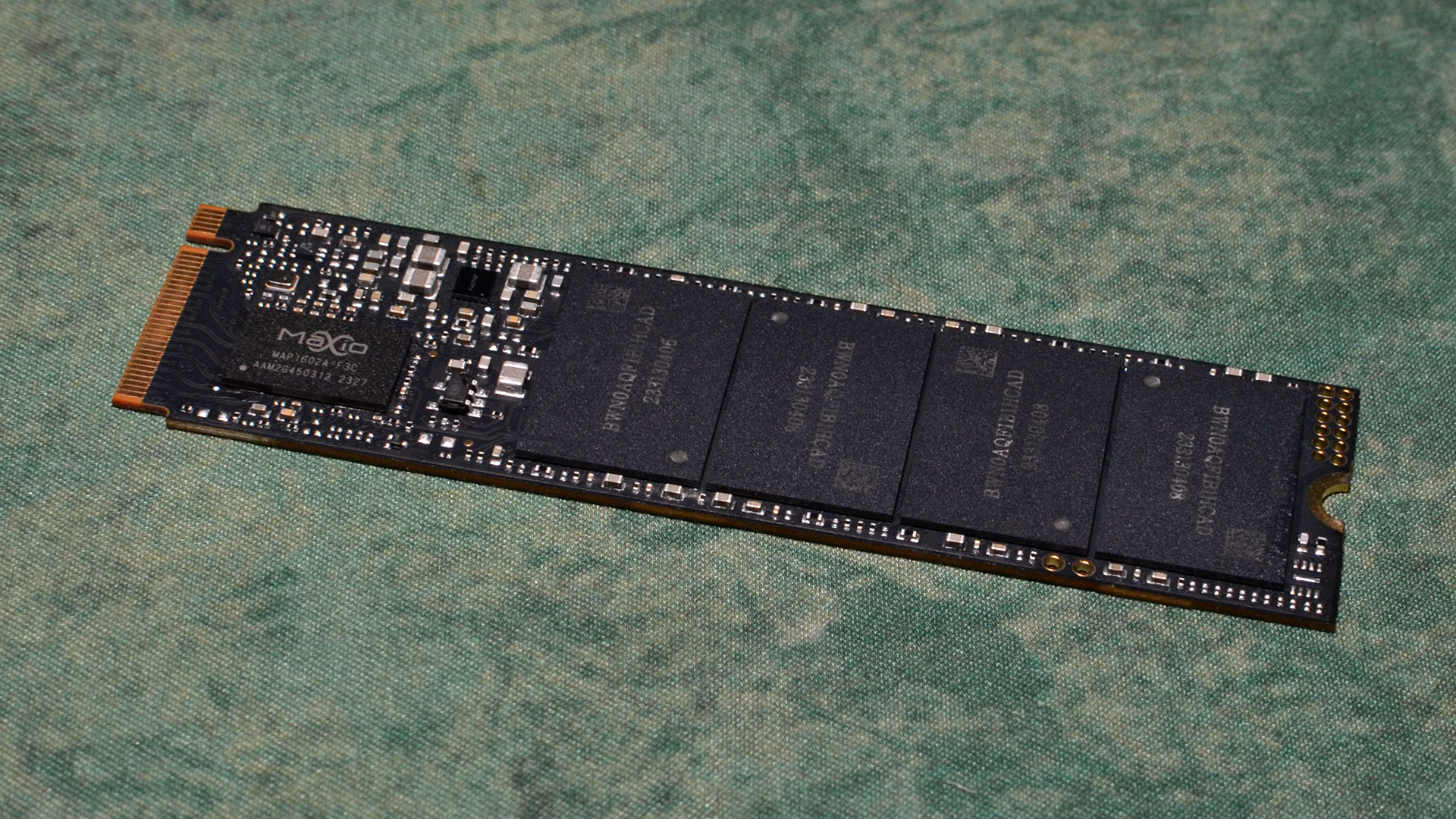
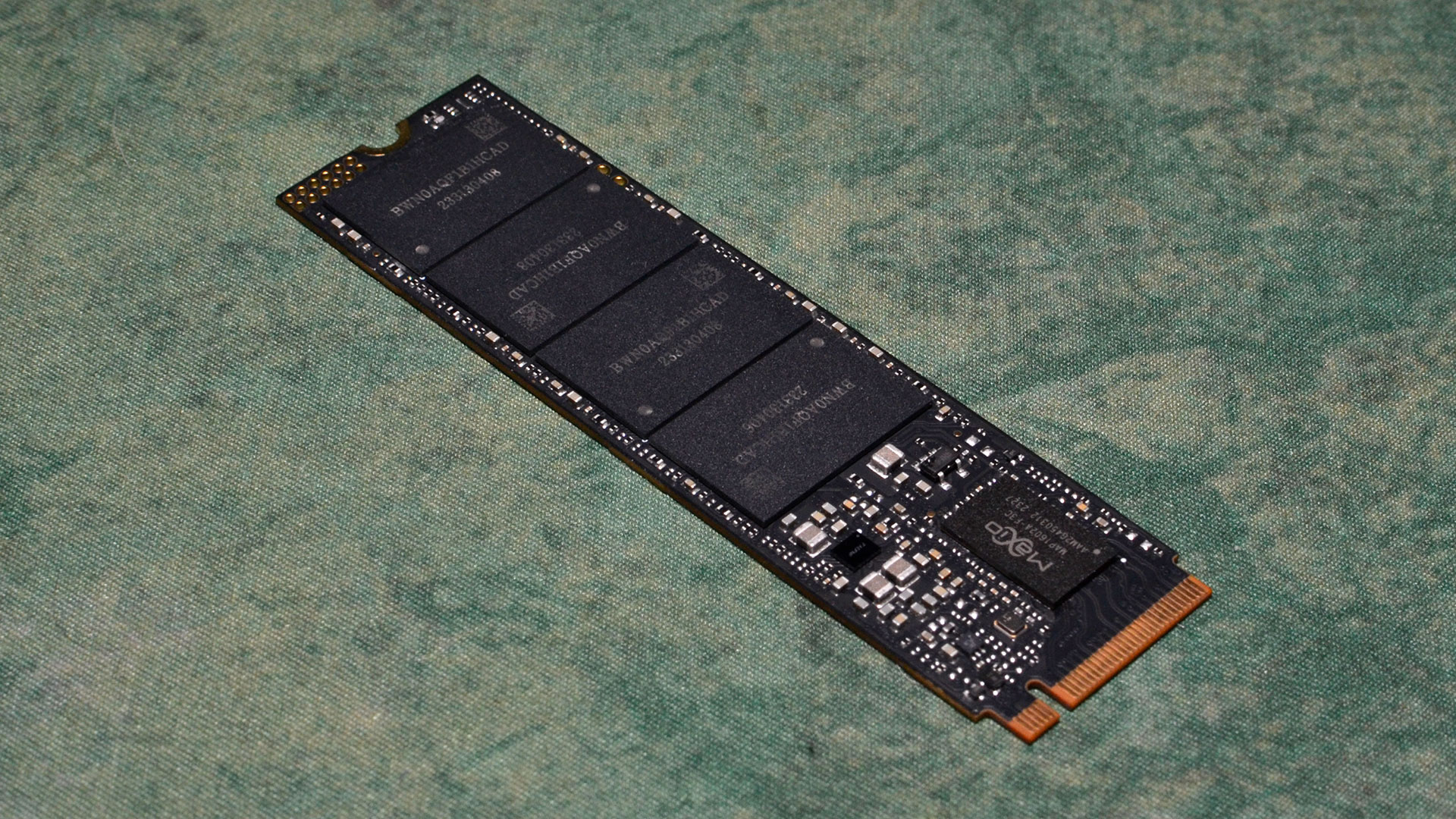
Our sample’s flash is labeled BWN0AQF1B1HCAD and is dated 2331 for the 31st week of 2023, placing the date of manufacture in early August. This compares with the date of 2319, or mid-May, on some ZhiTai Ti600’s, a YMTC drive that led to the reveal of the manufacturer’s cutting-edge 232-Layer QLC starting back in July. The flash on that drive is labeled the same except for the first two characters, with our “BW” indicating Biwin and that drive’s “YM” implying YMTC. The rest of the code can be compared to other drives for information on package density and generation — here we have four quad-die packages (QDP) with 1Tb dies for a total of 2TB.
YMTC’s claim to fame with this QLC is the highest commercial density on record at 19.8 Gb/mm2. Solidigm’s (formerly Intel's) 192-Layer QLC, which is based on a 5-bit penta-level cell (PLC) design, is listed as achieving 18.6Gb/mm2 in its 4-bit mode. Other flash manufacturers have plans for QLC with Samsung’s V9 due in 2024, SK hynix having a V8 QLC design in the works, Micron planning for denser QLC dies down the road, and Kioxia proposing a BiCS8 variant. These designs are comparable or higher in layer count and performance to YMTC’s current 232-Layer design, but they're not available yet.
This QLC utilizes YMTC’s Xtacking 3.0 technology, which we’ve covered in reviews and articles in the past. The company’s changes helped reduce the complexity and cost of manufacturing, which was a past concern for competitiveness. This wafer-on-wafer approach will be adopted by others as Samsung already has something similar on its roadmap and Kioxia has suggested its own CMOS Bonded to Array (CBA) design. YMTC already has refinement in mind with Xtacking 4.0 and a higher I/O speed, which includes a variant for QLC.
MORE: Best SSDs
Get Tom's Hardware's best news and in-depth reviews, straight to your inbox.
MORE: Best External SSDs and Hard Drives
MORE: How We Test HDDs And SSDs
MORE: All SSD Content

Shane Downing is a Freelance Reviewer for Tom’s Hardware US, covering consumer storage hardware.
-
Avro Arrow This doesn't really impress me because every real-world SSD performance test that I've ever seen shows little to no difference between a PCIe3 NVMe and a PCIe5 NVMe in over 90% of situations. This SSD will be really expensive and probably wouldn't really improve my experience over the one I have with my twin TeamGroup MP33 2TB PCIe3 NVMe drives.Reply -
gg83 What!?!?!?!? A cheap M.2 SSD that comes with its own screw!?!?!??!?!?! I just hade to buy a 10 pack to install one m.2 drive.Reply -
Pei-chen Reply
LOL, HP is literally the only laptop manufacturer that don’t include a screw for the spare M.2 slot. I’ve complained about it on Reddit; like how much are they saving from that 1 screwgg83 said:What!?!?!?!? A cheap M.2 SSD that comes with its own screw!?!?!??!?!?! I just hade to buy a 10 pack to install one m.2 drive. -
gg83 Reply
Lmao! I didn't think about it but that's why they include the screw with ssd. That's very back wards. I don't think my Alienware laptop had a screw for the second ssd slot back in the day.Pei-chen said:LOL, HP is literally the only laptop manufacturer that don’t include a screw for the spare M.2 slot. I’ve complained about it on Reddit; like how much are they saving from that 1 screw -
TJ Hooker Reply
What makes you say that? It's a DRAM-less drive, with Chinese QLC flash, from a brand that's not prominent in the storage market. It'll almost certainly be priced quite cheaply, at least if HP actually wants to sell any.Avro Arrow said:This SSD will be really expensive -
Avro Arrow Reply
That doesn't mean anything. These days, what matters most is the perception that marketers give consumers about whatever product that they're slinging at the time. That's how brand-wh0res are born and there's no shortage of them.TJ Hooker said:What makes you say that? It's a DRAM-less drive, with Chinese QLC flash, from a brand that's not prominent in the storage market. It'll almost certainly be priced quite cheaply, at least if HP actually wants to sell any.
Just look at the people who spend extra for ASUS or Samsung products just because it says "ASUS" or "Samsung" on them. People are generally too lazy to do any homework before purchases these days and just buy whatever "they heard" is good. People still have this outdated idea that "You get what you pay for" because these days, you often get the same as someone else is offering but you're still paying more because of the marketing involved. This is why some companies deliberately inflate their prices, because clueless consumers only seem to believe that something is "good" if they have to take out a second mortgage to get one. -
TJ Hooker Reply
Since when is HP a premium brand, either by reputation or pricing? Especially in the storage market, where they're a small player (as I mentioned previously). None of their previous SSDs have been expensive, even when fairly performant (e.g. the EX950) why do you think they'd suddenly change that for a mediocre-spec'd drive like this?Avro Arrow said:That doesn't mean anything. These days, what matters most is the perception that marketers give consumers about whatever product that they're slinging at the time. That's how brand-wh0res are born and there's no shortage of them.
Just look at the people who spend extra for ASUS or Samsung products just because it says "ASUS" or "Samsung" on them. People are generally too lazy to do any homework before purchases these days and just buy whatever "they heard" is good. People still have this outdated idea that "You get what you pay for" because these days, you often get the same as someone else is offering but you're still paying more because of the marketing involved. This is why some companies deliberately inflate their prices, because clueless consumers only seem to believe that something is "good" if they have to take out a second mortgage to get one.
This has the specs of a budget drive, and there's no reason to think it'll be priced otherwise. -
Avro Arrow Reply
To you and me, it's not. To the average schlep who knows about as much about computers as we do washers and dryers, HP is a top-tier brand because their printers are literally everywhere. The more they see the brand, the better they think it must be.TJ Hooker said:Since when is HP a premium brand, either by reputation or pricing?
Same as before, WE know that they're a small player but we are far more knowledgeable than the average person. We just sometimes don't realise it.TJ Hooker said:Especially in the storage market, where they're a small player (as I mentioned previously). None of their previous SSDs have been expensive, even when fairly performant (e.g. the EX950) why do you think they'd suddenly change that for a mediocre-spec'd drive like this?
There is one huge reason to think that it'll be priced otherwise. HP won't want to "cheapen" their name. They want their brand to be seen as expensive because that translates into "elite" in the mind of the average, ignorant human being.TJ Hooker said:This has the specs of a budget drive, and there's no reason to think it'll be priced otherwise.
Chris Farley and David Spade starred in a 90s movie called "Tommy Boy" and in that movie, the great Dan Aykroyd had the best line that I've ever heard in a movie:
z_3Cfz30IeY:49If you watch the entire clip, you'll see just how powerful brand marketing can be. GM has been doing it for years. Consider their old J-Body platform:
Chevrolet Cavalier:
Pontiac Sunbird:
Buick SkyHawk:
Oldsmobile Firenza:
Cadillac Cimarron:
These are all the same car (in case you couldn't tell) and all existed at the same time (up to 1988) but people were willing to pay a lot more for the Cimarron just because it had that Cadillac badge on it. You could tell these fools that it was just a Cavalier with a Cadillac badge but people thought that it must be different because it was more expensive and it was a Cadillac, not a Chevy. A perfect example of budget specs without the budget price.
People (like me) who were automotive enthusiasts were aghast that GM would try something like this but it worked (for awhile). People saw the Cadillac name and it was at a price that they could stretch to afford so they bought it. Why do you think people still buy Land Rovers today when they're absolute garbage? People don't know any better, plain and simple.
Truth doesn't matter in capitalist consumerism, only perception does.